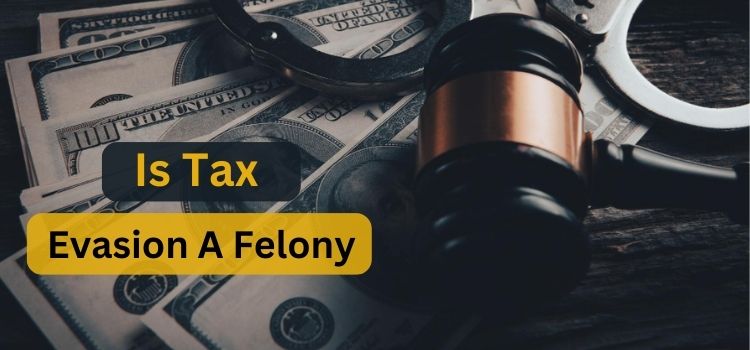Is tax evasion a felony? One of the most often searched terms on the internet when someone thinks they may have committed a severe tax violation is “tax evasion” and whether it is a crime.
Tax evasion is one of the tax crimes that the IRS and the U.S. government aim to pursue against taxpayers. It is a criminal violation. In the eyes of the IRS, anyone who knowingly or actively attempts to escape paying taxes is trying to steal money from the agency by artificially inflating their tax obligations. That’s why the IRS is seeking retribution.
In this blog, we will discuss tax evasion and if it is a felony.
What is Tax Evasion?
According to 26 USC 7201 Evasion, “Any person who willfully attempts in any manner to evade or defeat any tax imposed by this title or the payment thereof shall, in addition to other penalties provided by law, be guilty of a felony and, upon conviction thereof, shall be fined not more than $100,000 ($500,000 in the case of a corporation), or imprisoned not more than 5 years, or both, together with the costs of prosecution.”
That means the penalty for tax fraud in the United States is if you’re convicted, you may be fined up to $100,000 and sent to jail for up to five years.
Is Evading Taxes a Felony?
Yes, tax evasion is a felony. From the definition of tax evasion, we learned that it can result in penalties ranging from $5,000 to $10,000 in fines and 5 to 30 years in prison.
However, it’s crucial to understand that the definition of “evasion” affects how serious the crime is and, consequently, what penalties apply.
The three components of a crime are described in the tax evasion legislation, 26 U.S.C. 7201:
1. The taxpayer who owes back taxes
2. The taxpayer making an effort to avoid or avoid paying taxes
3. The taxpayer’s behavior was willful.
To sum it up, tax evasion involves deliberately and knowingly evading or avoiding the payment of taxes that are rightfully owed and it is a tax evasion felony. Felony tax evasion penalty ranges from $5,000 to $10,000 in fines and 5 to 30 years in prison.
Is Evading Taxes a Misdemeanour ?
Tax evasion is a crime. But is it a felony or misdemeanor? If a case really fits the definition of tax evasion in IRC 7201, then the action is a felony. The misconception is typically caused by the fact that some lawyers refer to a violation of section 7203 as a misdemeanor Is Tax Evasion A Felony. However, as described, this violation does not actually imply tax evasion. Despite the similar definitions of 7201 and 7203 offenses, the Internal Revenue law does not use the explicit phrase “tax evasion” to describe a 7203 misdemeanor.
People use the word “tax evasion” when talking about any kind of tax violation or tax fraud, which has led to confusion about whether tax evasion is a felony or a misdemeanor. It is important to know that tax evasion has a clear meaning in a criminal court. IRC 7203 may be used instead of IRC 7201 for any other kind of tax violation that isn’t specifically called “tax evasion.”
What Is Considered Tax Evasion?
The Internal Revenue Service takes a number of variables into account when deciding whether a taxpayer’s failure to pay a tax bill on time was accidental or intentional tax evasion. If the IRS suspects tax fraud or the existence of unreported income, it will conduct an investigation into the person’s finances.
If a taxpayer conceals their assets by linking them to another person, the IRS may see the tax return as fraudulent. By claiming income under a fictitious name and Social Security number, the taxpayer may have concealed these assets through a combination of identity theft and tax evasion. Willful tax evasion could also apply if an individual omitted to disclose work performed or income earned using a non-standard mode of payment recording. One example of this kind of tax evasion is when someone receives money in cash as payment for goods or services but then doesn’t include that money in their taxable income.
Tax Evasion Statute of Limitations
Tax evasion is a felony. Normally, the IRS has three years from the filing date to audit a tax return. The statute of limitations for federal tax fraud increases to six years if the IRS determines that more than 25% of the taxpayer’s income was omitted from their federal tax return.
To avoid fines and maybe serving time in jail, you must make sure that your corporations or businesses are in conformity with US tax regulations. A tax attorney will be an invaluable resource if you are facing charges. If you require guidance on how to deal with your tax position or need assistance in comprehending the tax code, make an appointment with a licensed tax attorney at Motazedi CPA
Frequently Asked Question
Why is tax evasion considered a felony?
Tax evasion is treated as a felony due to its serious nature and the deliberate intent to defraud the government of tax revenue. Felonies are typically associated with more severe penalties than misdemeanors, including substantial fines and potential imprisonment.
Can corporations be charged with tax evasion?
Yes, corporations can be charged with tax evasion if they intentionally engage in fraudulent activities to evade taxes. Corporate tax evasion involves the deliberate manipulation of financial records, underreporting income, or other deceptive practices. If found guilty, corporations may face substantial fines and other legal penalties.
Is tax evasion a felony?
Yes, tax evasion is considered a felony in many countries, including the United States. Felony is a serious criminal offense that typically involves intentional acts to evade paying taxes or providing false information on tax returns. Engaging in tax evasion can result in severe legal consequences, such as substantial fines, imprisonment, or both. The specific penalties vary depending on the jurisdiction and the amount of taxes evaded. It is important to consult with a qualified tax professional or legal advisor to ensure compliance with tax laws and regulations.


